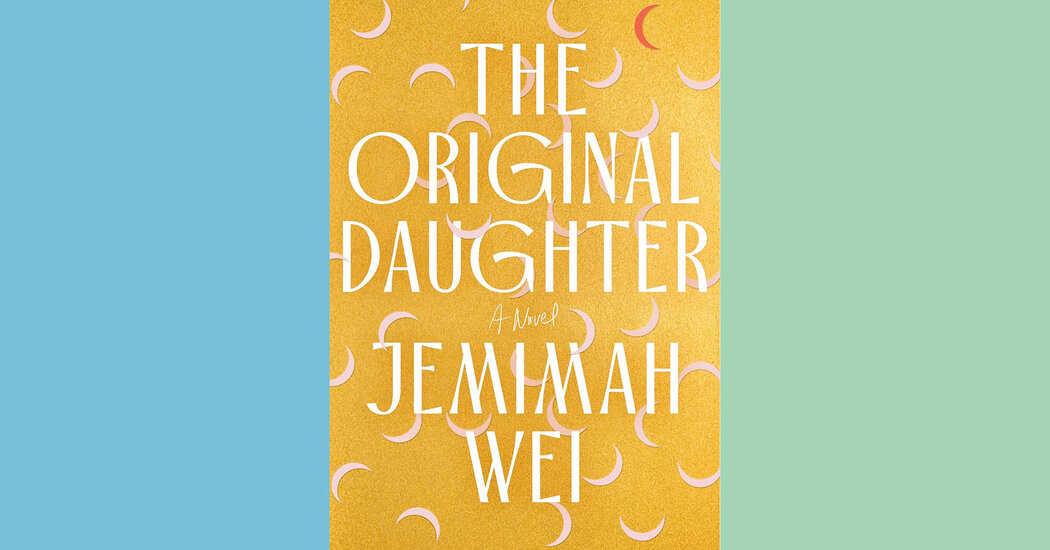THE ORIGINAL DAUGHTER, by Jemimah Wei
Jemimah Wei’s debut novel, “The Original Daughter,” lays bare the claustrophobia of familial love, the ache of unfulfilled dreams and the costs of repressed emotion, through the earnest and often knotty relationship between two sisters growing up in Singapore in the late 1990s and early 2000s. Genevieve Yang’s parents adopt 7-year-old Arin when her impoverished birth father — the son of Genevieve’s grandfather, who abandoned one family and recklessly began another — offers her up in desperation. But for all its tenuous harmony, the Yang household is no haven of privilege: Crammed into a one-bedroom flat in a public housing development in the town of Bedok, they are barely scraping by.
Despite the disruption Arin’s arrival brings, 8-year-old Genevieve throws herself into her new role as Jie Jie (“older sister”). The novel’s sympathetic but deeply flawed narrator, Genevieve is at once victim and bully, supporter and saboteur. Over the years she will love her increasingly codependent sister, listen to and guide her — and witness Arin surpass her in almost every way.
When the book opens in 2015, the Yang family — the sharp-tongued but magnanimous grandmother; the gentle father who is scarred by his own father’s deception, before repeating it himself; the mother, Su, whose persistent optimism both binds and alienates those around her; and the sisters — has been whittled down to just Genevieve and Su, who is dying of cancer. Arin, now a famous actor and “the only Singaporean in recent years to breach mainstream Hollywood, making her a national treasure,” has left home and left Genevieve behind.
From there the book jumps back in time to 1996, and we gradually learn that the sisters’ competition is as much about Su’s affection as it is about success. They spend their adolescence working hard in school and beyond, both together and apart, determined to break out of their working-class environment. But eventually Genevieve’s rising star stalls, and only Arin experiences the rewards of her labor.
Wei handles Genevieve’s dueling pride in and envy of her sister with grace and nuance. “Despite all my practice, my confidence faltered,” she thinks as she waits to hear Arin’s results on the same school exams Genevieve failed the year before. “I’d been dreading this day for so long.” When Arin reveals her perfect score, Genevieve thinks, “Something small died, deep in my soul.”
With time this imbalance in the sisters’ academic, professional and financial circumstances creates fissures in their relationship — and their respective relationships with their mother — that widen into chasms, as their inability to confront and atone for past wrongs calcifies into years of silence and sorrow. But this heartache and separation extend beyond the sisters. “Perhaps integral to all loving relationships is a necessary distance,” the adult Genevieve thinks as she’s attempting to reconnect with her estranged father,
because it allows us to make sense of and articulate our stories in a manner that’s essential to our survival, whereas when we push forward in pursuit of boundless intimacy, we provide the opportunity for the other person to puncture our sense of self, to, in moments of excitement or vindication, say, no, I remember it differently, that’s not at all how it happened.
The realization applies equally to her connections with her mother and sister; though the story unfolds from Genevieve’s point of view, Wei subtly invites the reader to imagine how the other characters’ perspectives on the events might differ.
The novel’s second act meanders slightly as Genevieve relocates to New Zealand, hoping to forge a new identity far away from her sister’s shadow and her mother’s high expectations. Here we’re introduced to a slate of less memorable characters who lead charming but unremarkable lives.
Through this emotionally heavy plot the novel thankfully maintains a sense of humor, and an engaging, matter-of-fact tone. If the pace slows down in the second act, the final quarter surges ahead as tensions erupt into a staggering act of betrayal.
Wei writes with a maturity that belies this novel’s status as a debut. Precise, layered and moving, “The Original Daughter” is a book not to miss.
THE ORIGINAL DAUGHTER | By Jemimah Wei | Doubleday | 354 pp. | $30
